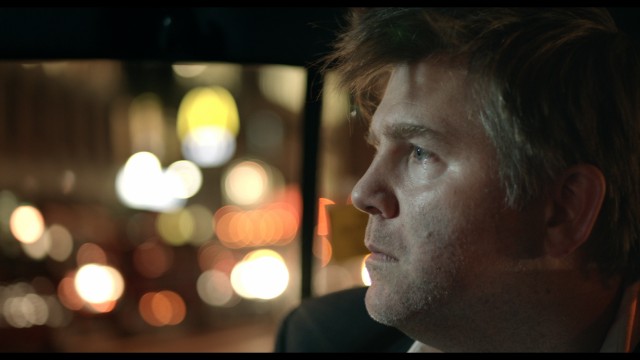SHUT UP AND PLAY THE HITS (Dylan Southern & Will Lovelace, 2011)
IFC Center
323 Sixth Ave. at Third St.
July 27 – August 2
212-924-7771
www.ifccenter.com
www.shutupandplaythehits.com
 On April 2, 2011, after ten years of building a devoted following that was still growing, electronic dance-punk faves LCD Soundsystem played its farewell show at Madison Square Garden. Directors Dylan Southern and Will Lovelace, who previously documented the British band Blur in No Distance Left to Run, capture the grand finale in the often bumpy, sometimes revelatory concert film Shut Up and Play the Hits. The movie is divided into three distinct sections that take place before, during, and after the massive blowout, with Southern and Lovelace weaving between them. There is extensive footage of the event at the Garden, including performances of such LCD classics as “Dance Yrself Clean,” “All My Friends,” “Us v Them,” “North American Scum,” and “Losing My Edge.” Although the multicamera approach tries to make you feel like you’re there, onstage and backstage with front man Murphy, keyboardist Nancy Whang, bassist Tyler Pope, drummer Pat Mahoney, and various special guests, it lacks a certain emotional depth, and the sound, primarily during the first songs, is terrible, although that could have been the fault of the tiny theater at the IFC Center more than the film itself. The second section features music journalist Chuck Klosterman (Sex, Drugs, and Cocoa Puffs: A Low Culture Manifesto) interviewing Murphy at the Spotted Pig in the West Village a week before the concert, asking inane, annoying questions that Murphy strains to answer. But the most fascinating part of the film by far, and how it starts, involves Murphy the day after the show. He allows the camera to follow him everywhere, from waking up in his bed with his dog to carefully shaving with an electric razor to visiting the DFA offices for the first time in a year. It’s hard to believe that the night before he was a grandiose rock star but now he is walking his pooch, sitting on a bench in front of a coffee shop, and spending most of the day alone. The camera literally gets right into his face, showing every gray hair, zooming in on his puffiness and his deep-set, nearly dazed eyes. The film would have benefited from less time with Klosterman and more with Murphy as he contemplates his past, present, and future. It also would have been interesting to hear from the other members of the band, but Shut Up and Play the Hits is specifically about Murphy, who, at forty-one, suddenly doesn’t know what to do with his life, having left an extremely successful gig that was only gaining popularity.
On April 2, 2011, after ten years of building a devoted following that was still growing, electronic dance-punk faves LCD Soundsystem played its farewell show at Madison Square Garden. Directors Dylan Southern and Will Lovelace, who previously documented the British band Blur in No Distance Left to Run, capture the grand finale in the often bumpy, sometimes revelatory concert film Shut Up and Play the Hits. The movie is divided into three distinct sections that take place before, during, and after the massive blowout, with Southern and Lovelace weaving between them. There is extensive footage of the event at the Garden, including performances of such LCD classics as “Dance Yrself Clean,” “All My Friends,” “Us v Them,” “North American Scum,” and “Losing My Edge.” Although the multicamera approach tries to make you feel like you’re there, onstage and backstage with front man Murphy, keyboardist Nancy Whang, bassist Tyler Pope, drummer Pat Mahoney, and various special guests, it lacks a certain emotional depth, and the sound, primarily during the first songs, is terrible, although that could have been the fault of the tiny theater at the IFC Center more than the film itself. The second section features music journalist Chuck Klosterman (Sex, Drugs, and Cocoa Puffs: A Low Culture Manifesto) interviewing Murphy at the Spotted Pig in the West Village a week before the concert, asking inane, annoying questions that Murphy strains to answer. But the most fascinating part of the film by far, and how it starts, involves Murphy the day after the show. He allows the camera to follow him everywhere, from waking up in his bed with his dog to carefully shaving with an electric razor to visiting the DFA offices for the first time in a year. It’s hard to believe that the night before he was a grandiose rock star but now he is walking his pooch, sitting on a bench in front of a coffee shop, and spending most of the day alone. The camera literally gets right into his face, showing every gray hair, zooming in on his puffiness and his deep-set, nearly dazed eyes. The film would have benefited from less time with Klosterman and more with Murphy as he contemplates his past, present, and future. It also would have been interesting to hear from the other members of the band, but Shut Up and Play the Hits is specifically about Murphy, who, at forty-one, suddenly doesn’t know what to do with his life, having left an extremely successful gig that was only gaining popularity.
